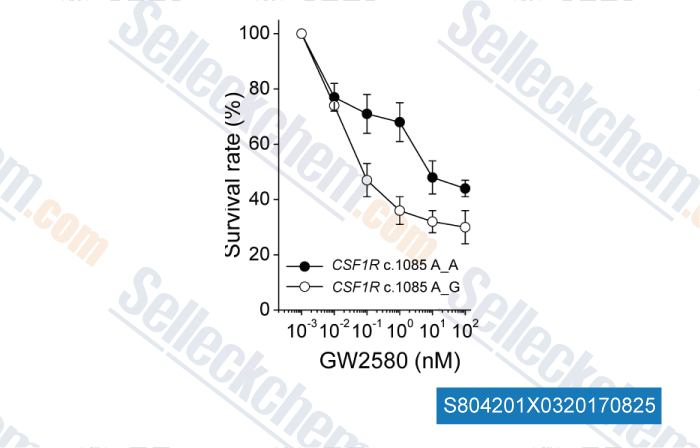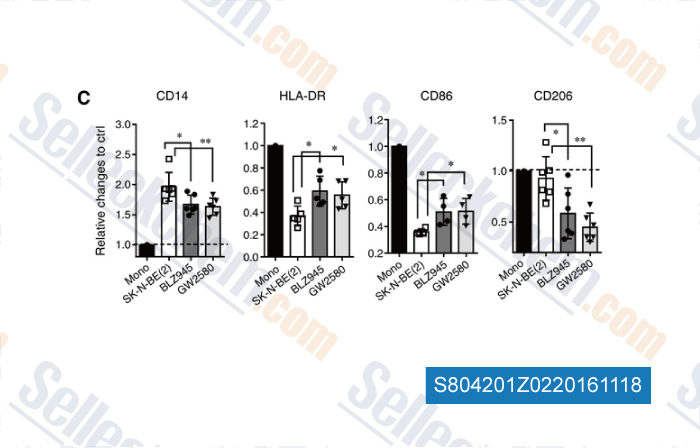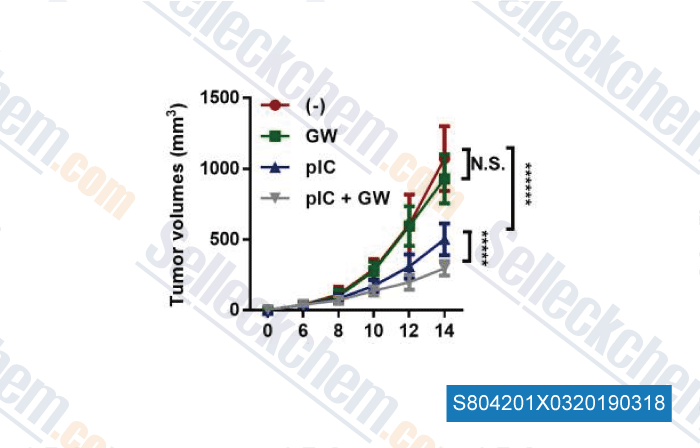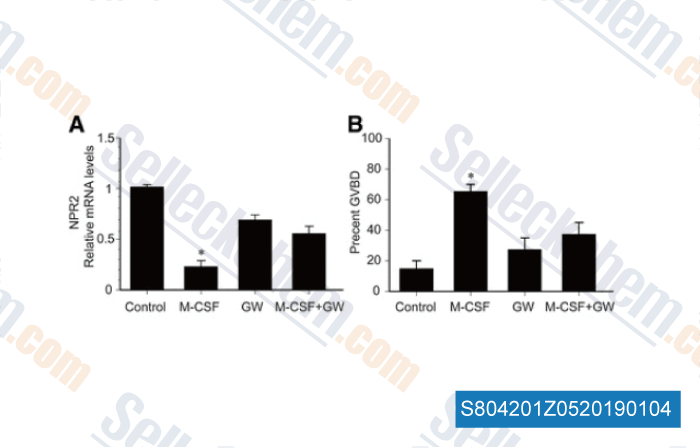|
How to Cite 1. For In-Text Citation (Materials & Methods): 2. For Key Resources Table: |
||
|
Toll Free: (877) 796-6397 -- USA and Canada only -- |
Fax: +1-832-582-8590 Orders: +1-832-582-8158 |
Tech Support: +1-832-582-8158 Ext:3 Please provide your Order Number in the email. We strive to reply to |
Technical Data
| Formula | C20H22N4O3 |
||||||||||
| Molecular Weight | 366.41 | CAS No. | 870483-87-7 | ||||||||
| Solubility (25°C)* | In vitro | DMSO | 9 mg/mL (24.56 mM) | ||||||||
| Water | Insoluble | ||||||||||
| Ethanol | Insoluble | ||||||||||
| In vivo (Add solvents to the product individually and in order) |
|
||||||||||
|
* <1 mg/ml means slightly soluble or insoluble. * Please note that Selleck tests the solubility of all compounds in-house, and the actual solubility may differ slightly from published values. This is normal and is due to slight batch-to-batch variations. * Room temperature shipping (Stability testing shows this product can be shipped without any cooling measures.) |
|||||||||||
Preparing Stock Solutions
Biological Activity
| Description | GW2580 (SC-203877) is a selective CSF-1R inhibitor for c-FMS with IC50 of 30 nM, 150- to 500-fold selective compared to b-Raf, CDK4, c-KIT, c-SRC, EGFR, ERBB2/4, ERK2, FLT-3, GSK3, ITK, JAK2 etc. | ||
|---|---|---|---|
| Targets |
|
||
| In vitro | GW2580 completely inhibits human cFMS kinase in vitro at 0.06 μM. This compound inhibits the growth of CSF-1 stimulated M-NFS-60 myeloid tumor cells, serum stimulated NSO myeloid tumor cells, CSF-1 stimulated freshly isolated human monocytes, and VEGF stimulated human umbilical vein vascular endothelial cells with IC50 of 0.33, 13.5, 0.47 and 12 μM, respectively. 1 μM of this chemical completely inhibits CSF-1-induced growth of mouse M-NFS-60 myeloid cells and human monocytes and completely inhibits bone degradation in cultures of human osteoclasts, rat calvaria, and rat fetal long bone. [1] It inhibits CSF1R phosphorylation in RAW264.7 murine macrophages stimulated with 10 ng/mL with IC50 of approximately 10 nM. [2] This compound also inhibits TRKA activity with IC50 of 0.88 μM. [3] | ||
| In vivo | GW2580 (dosed orally at 40 mg/kg 0.5 h before the CSF-1-priming dose) blocks the ability of exogenous CSF-1 to increase LPS-induced TNF-α production in mice by 63%. When given to mice before CSF-1 priming, this compound completely blocks the ability of CSF-1 to prime the mouse for increased IL-6 production. This chemical (80 mg/kg p.o.) completely inhibits the growth of CSF-1-dependent M-NFS-60 tumor cells in the peritoneal cavity. It (80 mg/kg) dosed orally twice a day the week before thioglycolate injection and for the 4-day period after thioglycolate injection, diminishes the accumulation of macrophages in the peritoneal cavity after thioglycolate injection (by 45%). [1] In a 21-day adjuvant arthritis model, this compound (50 mg/kg) dosed twice a day from days 0 to 21, 7 to 21, or 14 to 21 inhibits joint connective tissue and bone destruction. [3] This chemical (160 mg/kg) induces a more than 2-fold reduction of total CD45+ CD11b+ myeloid cells, CD11b+ F4/80+ TAMs, and CD11b+ Gr-1+ MDSCs in implanted 3LL lung tumor, through inhibiting tumor recruitment of myeloid cells from peripheral blood. It (80 mg/kg) treatment is able to suppress Vegf-a (by 35%) and Mmp9 (by 70%) expression, as well as tumor vascular density (CD31 staining). Combination therapy with this compound and an anti-VEGFR-2 antibody results in synergistic tumor growth reduction. DC101 alone reduces tumor growth by 35%, the combination of DC101 and this chemical results in an apparent synergistic tumor growth reduction of approximately 70%. [2] |
Protocol (from reference)
| Kinase Assay:[1] |
|
|---|---|
| Cell Assay:[1] |
|
| Animal Study:[1] |
|
References
|
Customer Product Validation

-
, , Clin Cancer Res, 2017, 23(20):6021-6030

-
Data from [ , , Clin Cancer Res, 2016, 22(15):3849-59. ]

-
Data from [ , , EBioMedicine, 2018, doi:10.1016/j.ebiom.2018.11.062 ]

-
Data from [ , , J Ovarian Res, 2017, 10(1):68 ]
Selleck's GW2580 Has Been Cited by 19 Publications
| Early life psychosocial stress increases binge-like ethanol consumption and CSF1R inhibition prevents stress-induced alterations in microglia and brain macrophage population density [ Brain Behav Immun Health, 2025, 43:100933] | PubMed: 39896839 |
| Cancer immunotherapy via synergistic coactivation of myeloid receptors CD40 and Dectin-1 [ Sci Immunol, 2023, 10.1126/sciimmunol.adj5097] | PubMed: 37976347 |
| Intraocular delivery of ZIF-90-RhB-GW2580 nanoparticles prevents the progression of photoreceptor degeneration [ J Nanobiotechnology, 2023, 21(1):44] | PubMed: 36747224 |
| Early life stress exposure worsens adult remote microglia activation, neuronal death, and functional recovery after focal brain injury [ Brain Behav Immun, 2021, S0889-1591(21)00097-0] | PubMed: 33677027 |
| Vascular endothelial S1pr1 ameliorates adverse cardiac remodeling via stimulating reparative macrophage proliferation after myocardial infarction. [ Cardiovasc Res, 2020, 10.1093/cvr/cvaa046] | PubMed: 32091582 |
| Selective Loss of Brain-Derived Neurotrophic Factor Exacerbates Brain Injury by Enhancing Neuroinflammation in Experimental Streptococcus pneumoniae Meningitis [ Front Immunol, 2020, 11:1357] | PubMed: 32676082 |
| Enhanced SPARCL1 expression in cancer stem cells improves preclinical modeling of glioblastoma by promoting both tumor infiltration and angiogenesis. [ Neurobiol Dis, 2020, 134:104705] | PubMed: 31830525 |
| Targeting colony stimulating factor-1 receptor signalling to treat ectopic pregnancy [ Sci Rep, 2020, 10(1):15638] | PubMed: 32973322 |
| Interleukin-34 Deficiency Aggravates Dextran Sodium Sulfate-Induced Colitis by Inhibiting the Epithelial Proliferation Through ERK Signal Pathway [ SSRN, 2020, 27 Pages] | PubMed: None |
| A Subset of TREM2+ Dermal Macrophages Secretes Oncostatin M to Maintain Hair Follicle Stem Cell Quiescence and Inhibit Hair Growth [ Cell Stem Cell, 2019, 24(4):654-669] | PubMed: 30930146 |
RETURN POLICY
Selleck Chemical’s Unconditional Return Policy ensures a smooth online shopping experience for our customers. If you are in any way unsatisfied with your purchase, you may return any item(s) within 7 days of receiving it. In the event of product quality issues, either protocol related or product related problems, you may return any item(s) within 365 days from the original purchase date. Please follow the instructions below when returning products.
SHIPPING AND STORAGE
Selleck products are transported at room temperature. If you receive the product at room temperature, please rest assured, the Selleck Quality Inspection Department has conducted experiments to verify that the normal temperature placement of one month will not affect the biological activity of powder products. After collecting, please store the product according to the requirements described in the datasheet. Most Selleck products are stable under the recommended conditions.
NOT FOR HUMAN, VETERINARY DIAGNOSTIC OR THERAPEUTIC USE.
